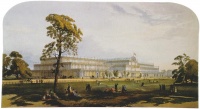Modern
From The Art and Popular Culture Encyclopedia
(Difference between revisions)
| Revision as of 13:20, 26 July 2007 WikiSysop (Talk | contribs) ← Previous diff |
Revision as of 21:49, 30 September 2008 Jahsonic (Talk | contribs) Next diff → |
||
| Line 1: | Line 1: | ||
| + | [[Image:The Crystal Palace.jpg|thumb|right|200px|The usage of new materials such as [[iron]], [[steel]], [[concrete]] and [[glass]] is ascribed an important place in [[modern architecture]], with [[the Crystal Palace]] of [[1851]] considered as its first large scale use.]] | ||
| {{Template}} | {{Template}} | ||
| '''Modern''' generally means something that is "up-to-date", "new", or from the present time. The term was invented in the early 16th century to describe recent trends. | '''Modern''' generally means something that is "up-to-date", "new", or from the present time. The term was invented in the early 16th century to describe recent trends. | ||
Revision as of 21:49, 30 September 2008

The usage of new materials such as iron, steel, concrete and glass is ascribed an important place in modern architecture, with the Crystal Palace of 1851 considered as its first large scale use.
|
Related e |
|
Featured: |
Modern generally means something that is "up-to-date", "new", or from the present time. The term was invented in the early 16th century to describe recent trends.
- Modern Times
- Modern Age (periodical), an American conservative publication
- Modern Art, a form of art.
- Modern architecture, a style of architecture
- Modernity, a very loosely defined time period from late 19th to early 20th century
- Late Modernity
- Modern dance, a dance form developed in the early 20th century
- Modern literature
- Modernist poetry
- Modernism
- Postmodernism
- Modern music
Unless indicated otherwise, the text in this article is either based on Wikipedia article "Modern" or another language Wikipedia page thereof used under the terms of the GNU Free Documentation License; or on research by Jahsonic and friends. See Art and Popular Culture's copyright notice.

